
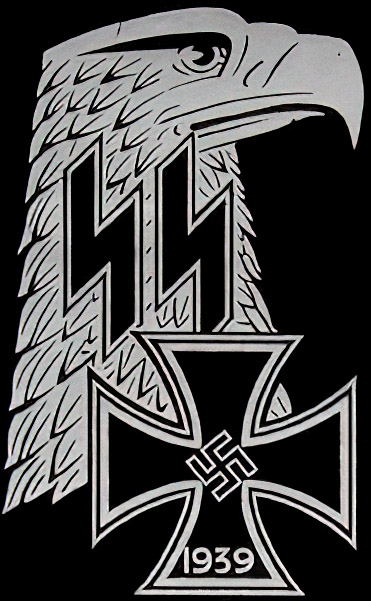
Interview with Max Hansen, Knight's Cross with Oakleaves winner and Regimental Commander
of the elite 1. SS-Panzer Division Leibstandarte SS-Adolf Hitler, Niebull, Germany, 1983.
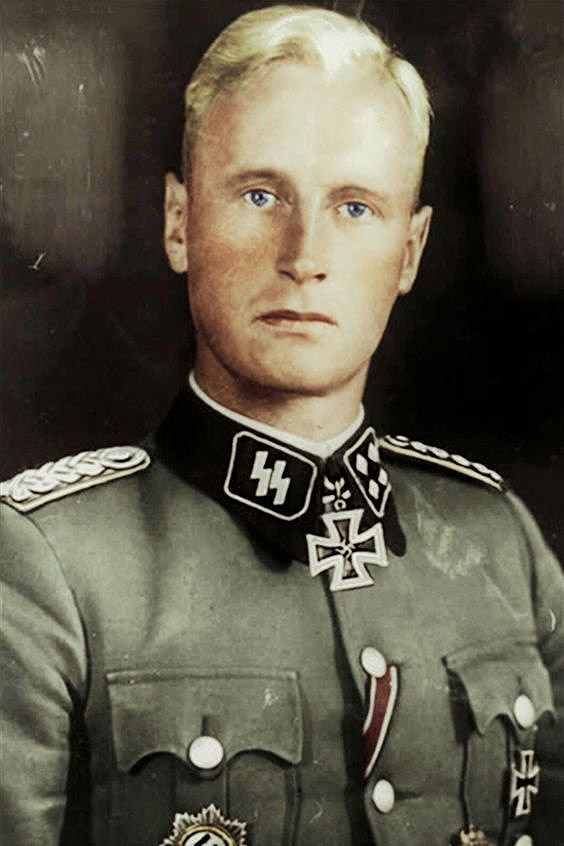



Interview with Max Hansen, Knight's Cross with Oakleaves winner and Regimental Commander
of the elite 1. SS-Panzer Division Leibstandarte SS-Adolf Hitler, Niebull, Germany, 1983.


Thanks for agreeing to meet with me; I would like to start by asking what brought you to join the SS?
Max: Young man, it is my pleasure to talk to you, my memory is not as good
as it once was, but I will try to answer your questions. I joined the LAH [Leibstandarte SS-Adolf Hitler] because I saw in this organization the elite of the German nation. The
Reichsführer-SS Himmler had a dream of a united Germanic peoples working
to rebuild genetic traits that were being lost to mixing of blood; Germany was
tied to this blood line.
I saw what the enemies and foreign influence were doing to
Germany, I revolted against this. There were many men who revolted against
this destruction; we revolted by joining Adolf Hitler. I was in the SA first,
and then saw that the SS were more of the loyalists of the National Socialist
movement. The SA was the military arm that fought the Red front, and many
were still Red-leaning, or wanted a different direction than the Führer. This
is why they were purged in 1934; many became a liability by preaching revolt.
Many friends at the time felt the same way; the SS was for me the
best place to go to see the dream of National Socialism come to fruition. I
was from a large family and one of my brothers joined the LAH, also going
on to win the Knight's Cross and hold the same rank as me. I met
Reichsführer-SS Himmler at my commissioning, and he was pleased with the
many Nordic-looking officers in my class, he said, "Men, your blood is a
treasure, and must always be safeguarded, choose ye well the woman you
will marry to continue this line."
It gave me great pride to be in the most elite and loyal regiment of
the SS and it is truly a pleasure to meet someone so young who understands
why I feel this way. I do not even talk to my family, as they cannot understand
what it meant to me, and still means to me to this day. This is why I meet often
with comrades like Adi and Willi. We are loyal until the end.
What was your impression of Hitler, and did you ever meet him personally?
Max: Yes, we were his personal bodyguard, so we saw him often. I met him
once on my birthday, and when he found out, he had a cake made for me and
sent his personal greeting. He was a man who was warm and very friendly. My thoughts were that he was not the usual politician in his demeanor, but
much more related to the common person. No other leader has been so
popular and loved.
He was able to rise from the ranks of commoners and lead because
he was a commoner and spoke the language of the people. He always made
a very good impression on me and I was proud to wear his name on my sleeve
band. He brought out the best in the German people and taught us to work
together to build a nation and culture that was envied by many. This is why
so many stayed loyal to him, even through the victor's lies and rumors, we
knew him, and knew his deeds. He lived and died for us.
You were involved in the Polish campaign, what do you remember?
Max: Yes, the LAH Brigade was involved in Poland. We were guarding the
flank of an army division then. The LAH was ordered to war on the 1st of
September and moved into enemy territory, which had previously been
German before Versailles took it away. I still see the people who greeted us
when we advanced; they thanked us for freeing them from Polish oppression.
The Poles massed army units on the border, which were broken by
superior air and artillery. At first it seemed like a vast parade, civilians
cheered us in every village and town we entered. It was only when we
advanced deeper that things changed. We had to fight off Polish cavalry
attacks and other uncoordinated actions. I felt sorry for them, as they had
been inflamed by their war hungry leaders and were falling when they did
not need to.
I looked upon the countless prisoners we captured with pity. One
young boy who looked not even 17 and was shot in his arm; our medics
bandaged him and I offered him a piece of chocolate I had. Many Polish
soldiers behaved well and had good military training, which kept them
disciplined in defeat. My company had a good deal of prisoners to deal with
and we talked to them for a long time before sending them to the rear. Many
told us that war was not what they wanted, and we joked with them that they
were going towards Berlin [the Polish government had recently bragged in the news how they were going to march into Berlin-Ed.], but not in the way they thought.
Polish civilians were friendly and not even scared; Germans had
been this way before [during World War One]. As we got deeper into enemy land, mines and attacks
by armored cars, with a few cavalry slowed us. The Allies claimed they
bravely attacked Panzers like knights of old, we did not have Panzers, but
they did. Our column of old trucks and cars repulsed them quite easily. The
Pole was a brave fighter, but not good at tactics.
Our small regiment marched on; by now the Poles had been broken
into surrounded groups, which other units mopped up. We were able to rest for a few days; gypsies came and tried to sell us items, but we knew their
tricks and watched our wallets. I remember a small celebration they had by
our camp, some men went to dance and drink with them as some of the
women were belly dancing naked. After Poland, we came back to Germany
to prepare for France.
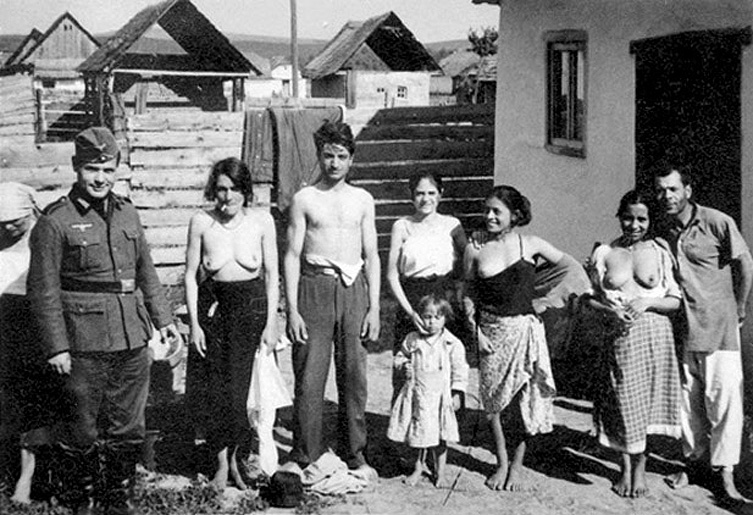
[Above: A Wehrmacht soldier stands with a group of Gypsies, some of them topless.]
What was the campaign against France like?
Max: I was now in the 12th MG Company and we were moved to the Dutch
border in May. Given the order to start the attack, we crossed and easily
brushed the Dutch aside, they had no appetite for war. Our mission was to
link up with our paratroops. I remember the long columns of prisoners, and
we felt unstoppable.
We advanced into France and attacked Tommy [British soldiers], stopping their
attack at Arras and pushing them back to Dunkirk. It was with confusion and
anger we were ordered to stop our attack. Sepp Dietrich was livid, and even
pressed a new attack against the enemy on the opposite side of a canal; he
earned the Knight's Cross for this decisive attack that could have kept going.
The Führer appeared to have let Tommy off the hook, if Sepp Dietrich was
allowed, we would have smashed the pocket.
I will tell you also, we were prepared for a long battle with the
French, but our successful tactics routed them and brought us victory in a
month. After Dunkirk, we had free movement in France; our biggest task was
helping the millions of refugees who had been told to flee. Our medical unit
often stopped to help French families needing food and care. We passed a
pioneer unit helping a farmer rebuild his fence and recapture his cows. We
called them the farmhand platoon after, I remember that.
Can I ask about the English claims that the LAH murdered 80 prisoners at
Wormhout [France] in 1940?
Max: These are only claims. No one I have spoken to knows anything about
this. Lately renewed cries have gone out to prosecute Willi, and others. I
looked into this with Willi, as he is part of our comrade's association. We
found not one soldier who saw anything regarding this incident. Either the
English soldiers have made this story up, or our men are lying. Since our
policy was very clear, with clear orders to take prisoners and bring no harm
to them, it is hard to believe the English. I can tell you if a soldier killed a
prisoner he would go before a court of honor.
It is not impossible that soldiers, who survived humiliating defeats
when they were told the fight would be easy, could make up lies regarding their enemy. I do know that some British units used illegal ammunition [exploding bullets, for example] and
deception, but the units we fought against fought with honor. We would
have had no cause to shoot prisoners, unless there were fights or unruly
prisoners that invited retaliation. But this is not what they claim, they claim
grenades were thrown at them in a barn and then they were executed, with
some surviving. It makes no sense and I believe they concocted this while in
POW camps as a way to get revenge on their enemies.
We fought the war with honor and had strict rules regarding
treatment of prisoners; even partisans were many times afforded protection,
when the rope should have been their fate. All men of the SS would have
revolted in anger if we had to be used as executioners of civilians or prisoners.
Did we at times have to do battlefield justice regarding partisans? Yes we
did. It disgusted me to see our men used this way, but you must remember
these were reprisals for crimes of murder in most all cases.
You won the Knight's Cross retaking Kharkov, can you describe this battle?
Max: At this time I was in command of a Panzer grenadier unit and so fought
alongside our Panzer regiment. For the LAH this was our greatest victory, as
we smashed a superior army. We had just returned after a long stay in France
to halt the Russian advance post Stalingrad. Kharkov had fallen, and we
engaged fresh Russian divisions; this time our division had better Panzers
including a new weapon: the Tiger. The Tiger was able to knock out all
enemy armor, and they feared this weapon.
The LAH halted the Russians, and by March we were prepared to
recapture lost ground. The city was the prize and [Sepp] Dietrich briefed us on how
important the coming battle would be. The Russians fortified every barn,
house and building in the surrounding area; we were hungry to attack to get
payback for the loss at Stalingrad. Our guns were red hot and steaming after
knocking out the many strongpoints.
When we attacked the city there was heavy snow, I remember that,
and it was cold. This was our second winter on the Eastern Front, and now
we were better prepared with warm clothing and better treatments for
vehicles and weapons. The Panzer regiment smashed through the Russian
defenses, and the grenadiers were right behind. Our men had to take every
house, and the Panzers were engaged at every corner; the Russians were very
cunning fighters and placed anti-tank guns at angles hard to see.
I saw an opportunity to move into the square and took it, knocking
out nests of resistance and forcing the enemy to scatter. We broke through to
the square with minimal losses and secured the area while battling snipers
and stragglers. We named the square after our division. My men were brave and faced uneven odds that would have stopped ordinary soldiers, but not the
LAH.
In addition, a Russian hospital housed many wounded soldiers and
civilians, close to our positions. They claim we shot all the wounded, we did
not. I was appalled when we entered that the staff and doctors had fled,
apparently the commissars ordered them to leave since they were too valuable
to lose. Our medical staff was far behind, and not in the city, so many of the
badly wounded succumbed, as there was no treatment. We did what we could
for them, but several did die, and we had prisoners carry them outside. I
witnessed German dead also, that prisoners told us, were refused any
treatment.
This was a very hard-fought battle and showed a smaller German
force could still defeat a larger Russian army. It gave us renewed confidence
and we held onto this area against heavy attacks with very little losses. I was
proud when Dietrich advised me I was being awarded the Knight's Cross, but
my men earned the award; it is the men under my command whom I owe the
decorations to.
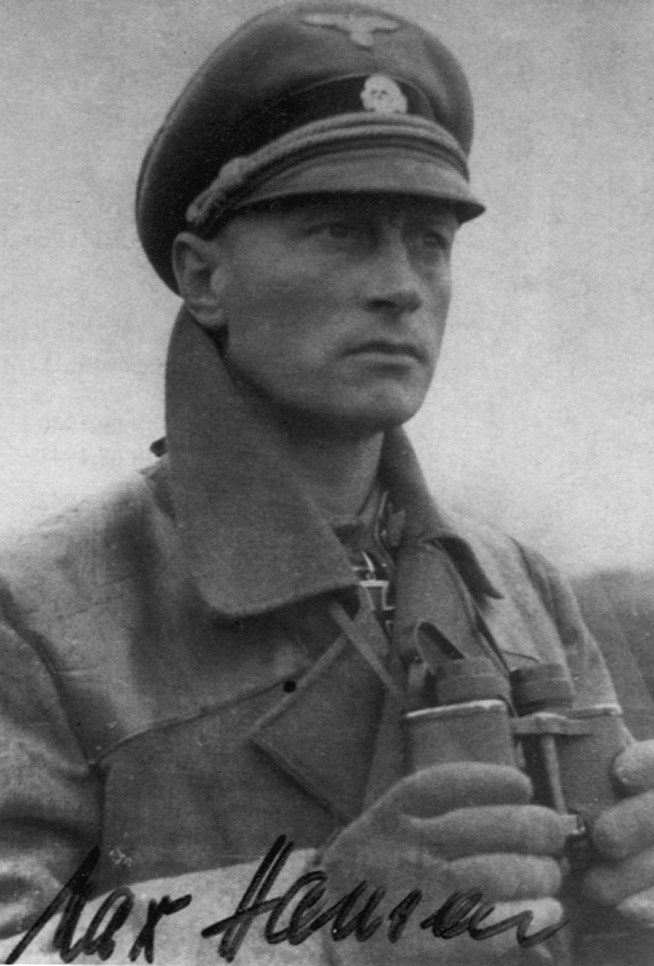
[Above: LAH Regimental Commander Max Hansen.]
How did you view the Russian soldier?
Max: He was, and always will be, a fiend. They fought like criminals in a
dark alley. They had no honor then and no honor now. I personally saw
them shoot prisoners and civilians. To give you an example, I remember I
was with the Panzer regiment watching the Russians retake a village we gave
up. The first act they did was pull the civilians out of their huts, they
obviously were asking who worked with us or helped us. A partisan pointed
out a few people, and a commissar shot them.
I asked if the Panzer could open fire, but they needed to save rounds
for a counter-attack. Even though Sepp Dietrich was able to secure the best
and newest weapons for the LAH, the same issue the army had, too few
supplies and ammunition at times, cursed us.
We saw this behavior repeatedly; we had to contend with fanatical
soldiers who, until killed or captured, would use any means to kill. They had
such stockpiles of ammunition; they shelled recklessly, often-destroying
places where we were not. They were masters at playing dead and shooting
soldiers in the back. They used civilians as shields and went to great lengths
to be cruel. Anyone they were told had helped a German was shot, or if they
were lucky, sent to camps.
We had Russian helpers, and one told us the reason Russians were
scared to surrender was they were fearful their families behind the front
would suffer as traitors. They had political officers that went around taking names and addresses of the families so if the soldier deserted, the family paid
the price. I saw one of these lists on a captured officer. How anyone defended
this regime I still cannot understand, and today our young are taught we were
the monsters.
It is true that some Soviets showed restraint and fair play, but my
experience with them was not good and left me with bad observations.
Germany surrendered in 1945; they did not return prisoners until 1955. They
accused us of crime after crime, including killing millions of their prisoners.
The truth is many of their prisoners joined us; the ones who did not were
treated fairly. Stalin had many former prisoners killed for surrendering, then
blamed the loss on us.
The propaganda films they show for their newsreels show a happy,
peaceful army being welcomed by the citizens as liberators and heroes. Their
propaganda companies staged all these. Most Russians opposed the Soviets
and thanked us for giving them religious freedom again. Before the attack on
Kharkov, an orthodox priest came out to bless the Panzers of the division.
What about the SS being labelled as a criminal organization at the post-war
trials?
Max: While some men who wore the uniform may not have acted within the
rules of war in a time of heated anger, I do not believe we were any more
criminal than our adversaries. I can speak for my men, and I will tell you
clearly and without reservation, we are not criminals. We defended our
nation, oftentimes against very brutal foes who fought with hate against us.
We allowed many men from many different nations to join us, and
I saw with my own eyes some of the actions they were in, they fought bravely and
with honor also. At times, when dealing with illegal partisans, they showed
no mercy, but partisan warfare often had no mercy. The people who
decided to pick up arms against us while not wearing a uniform were
criminals themselves, and the results of their actions killed people who
should not have died. Exacting a reprisal to stop this was not a crime.
The storytellers today teach our grandchildren that we lived only to
roam from town to town rounding up civilians and shooting them. This is
nonsense and is only getting worse. A local school uses a former Communist
camp inmate who gets to teach these students that we lined up orphans and
used them for target practice to sight in new rifles. An Italian Communist
partisan claimed we used Panzers to run over sick orphans, and then
bayoneted them for good measure. It is a circus with the lies they can tell.
This should be a crime, as it tells a tale that we issued strict orders
to target any civilians, especially Jews, and the Catholic Church is jumping in now claiming we killed both wherever we went. Most all SS men were
members of the church; this is ridiculous. They also claim we persecuted
Christians on the Reichsführer-SS Himmler's orders, what stupidity; I am a
Christian but this makes me question my faith when my own people join in
speaking this nonsense and this why so many SS men left the corrupt church.
We cannot fight against these lies either. Back in the fifties and
sixties we could to a degree, but now laws are made that make any attempt
to challenge the Allied version of the war a crime. Some former soldiers have
lost pensions due to this. Now most everyone shuts up, and just tries to get
by, trying to forget what we went through. We must be very careful with
whom we speak to as well, the wrong word in the wrong hands invites
charges and attacks. I fear they may prey on us, as we age and our memories
fade where we say thing we do not mean. The occupiers control this apostate
Federal Republic.
Do you believe Germany could have won the war?
Max: We could have won but it would have meant arming for war much
earlier, bringing new weapons to us earlier, finding traitors earlier, and
allowing the SS to be independent. We could not hope to match the output of
the Allies, so all we could do was quick victories and then negotiated peace
treaties. In this we failed, and in the end, we were beaten by superior numbers
and weapons; ours were too few.
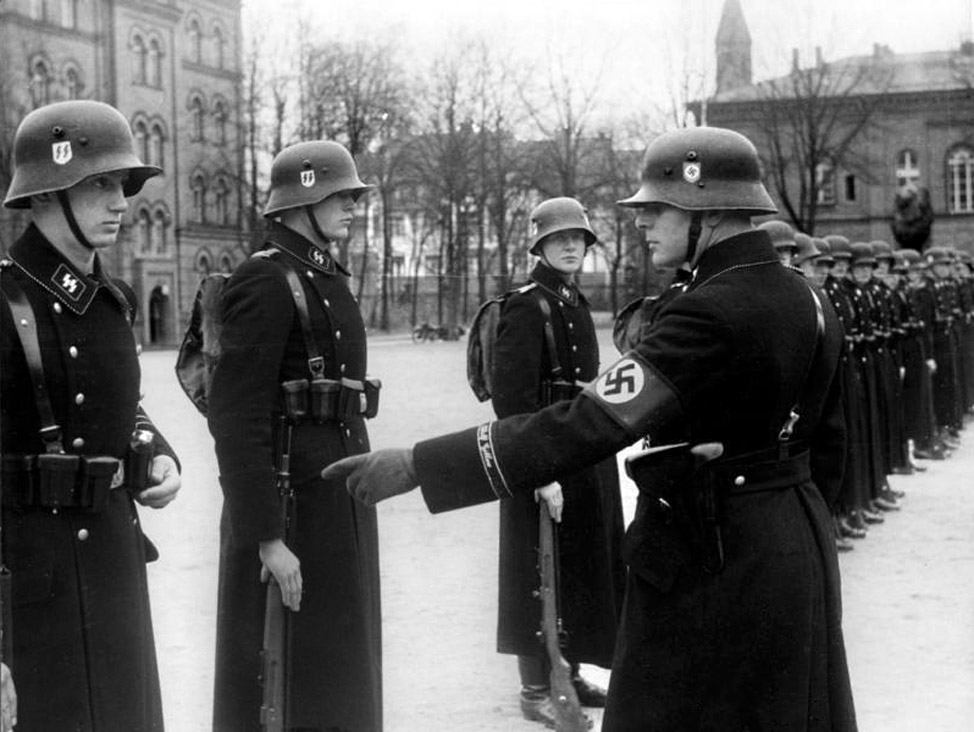
[Above: Leibstandarte-SS Adolf Hitler barracks in Berlin, 1938.]
[Above: LAH Regimental Commander Max Hansen.]
"SS-Sturmbannführer Hansen has highly distinguished himself in the campaigns in Poland, the West, the Balkans and Russia (1941/42 and 1942/43).
Following the capture of Rostov on the 20.11.1941, in the winter battles of 1941/42, Hansen was decorated with the German Cross in Gold.
By the 11.03.1943 Kampfgruppe Witt had thrusted through Polewaja—Dertgatschi—Pscherkaskaja-Losswaja, the ultimate aim being to move along the Belgorod—Kharkov road in order to strike Kharkov from the north.
Later on the same day, SS-Sturmbannführer Hansen made the independent decision to move against the northern edge of Kharkov's city centre.
Through the decisiveness and personal example of SS-Sturmbannführer Hansen, and the élan of his troops in the tough urban combat, the way for the bulk of the Regiment into the inner part of Kharkov was opened up,
On the 12.03.1943 the northern part of Kharkov was finally cleared 0f the enemy and declared secure following hard and costly fighting.
On the 13.03.1943 another Kampfgruppe, deployed from Dergatschi to Kharkov, succeeded in entering the north and northwestern part of Kharkov and capturing the village of Alexajewka.
The establishment of contact between both Kampfgruppen in the area just south of the 'Red Square' laid the groundwork for the continuation of the battle within the city centre and eastern part of Kharkov."
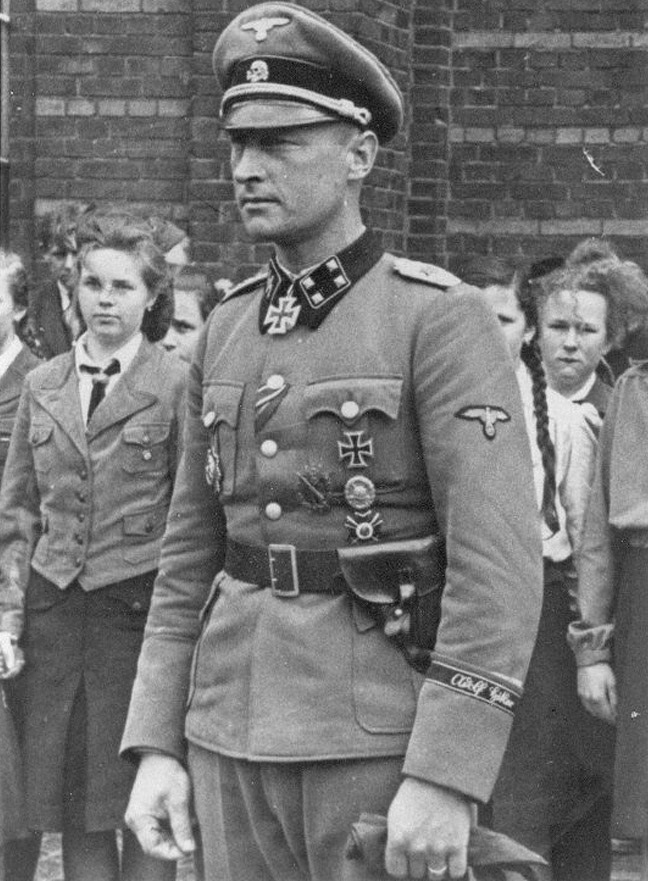
On the 10.03.1943 Hansen and his Bataillon captured Dertgatschi in a bitter house-to-house fight and furthermore captured the village of Ssekeniki in the twilight of the same day.
A morning attack on the 11.03.1943 along both sides of the march route by a reinforced Battalion of Kampfgruppe Witt came under heavy defensive fire to the north and west of Bypredem and bogged down.
Kampfgruppe Hansen, deployed to take control of the district of Schatiliwka to the west of here, succeeded in penetrating past the southern edge of Bypredem after a ferocious urban battle.
At 12:00 on this day he and his men reached the so-called 'Red Square' (or 'Square of the Wehrmacht') after hard fighting through houses and streets.
Fierce enemy counterattacks from the south and southeast were repulsed with bloody losses for the enemy. After leaving behind a small security force at the 'Red Square',
SS-Sturmbannführer took the bulk of his Battalion along the road to Belgorod on his own initiative to permit the bulk of the Regiment to enter Kharkov.
With its commander at the spearhead, the Battalion succeeded in capturing an extremely strong roadblock at the northern edge of Kharkov and removing it.
and the capture of the northern part of the city was ensured. Having personally participated in the close combat, SS-Sturmbannführer Hansen was wounded here for the fourth time by a shell splinter in his face.
Here as well SS-Sturmbannführer Hansen further distinguished himself through his personal example of courage and bravery.
In order to facilitate the further advance of this Kampfgruppe, Hansen once again moved with his Kampfgruppe on his own initiative to a point about a kilometre west of the 'Red Square'.
By destroying 8 T-34s that were in front of the Kampfgruppe that was attacking from Dergatschi, the way for this Kampfgruppe into the northwestern part of the city was opened.
Back to Interviews